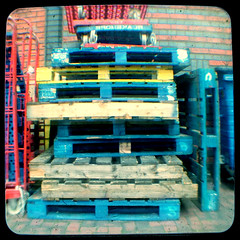
Image by Pete Ashton via Flickr
For companies that are in the business of order fulfillment, having well-organized logistics management is essential. It is essential for any business to have a predefined means of seeing that products arrive at their destinations in a timely fashion, and this means having logistics management tools that will allow you to handle the process in the most effective way possible.
That doesn’t mean you have to buy the most expensive equipment available on the market and pay your employees salaries that price your company out of the market. What it does mean is having logistics management tools that will allow you to perform all of the functions necessary to assure the smoothest logistics management possible.
Even on a limited budget there are plenty of logistics management tools available at your disposal. It doesn’t mean you have to use an automated computer system; if you have a small company, it may be more financially feasible for you to begin with manual logistics management tools. One of the most important tools of logistics management is inventory management and inventory control.
Without inventory control you will lose track of what you have on hand and thus your fulfillment services will suffer. One of the first things a new company must do is formulate a logistics management system that will allow it to keep track of all incoming and outgoing supplies or products. Whether you choose to perform this function manually or through an automated system is up to you.
Order fulfillment is an important function of the general logistics management operation. Since logistics management involves the transfer of goods from one place to the other, part of this process will naturally be based upon shipment to customers. This shows why it is so essential for a company to have good inventory management–you can’t sell what you don’t know you have or are capable of producing by the time the customer needs it.
Good logistics management also means good time management and the ability to plan for the future. You can’t rely on just today or tomorrow; you have to be able to see into the foreseeable future in order to make projections concerning the future needs of your customers. This also means if you are in a production environment, you must also be able to identify your needs for the suppliers where you obtain the raw goods you use in the production of those products.

